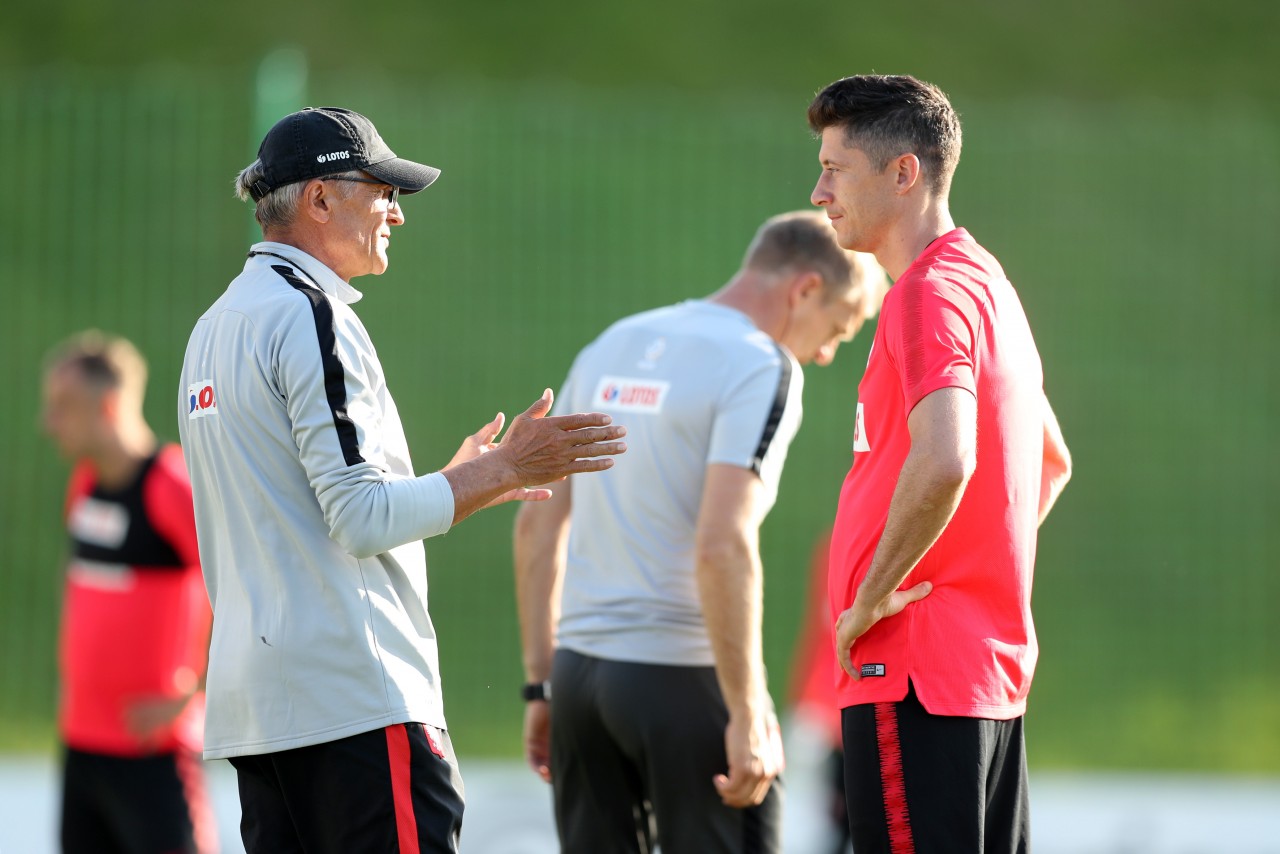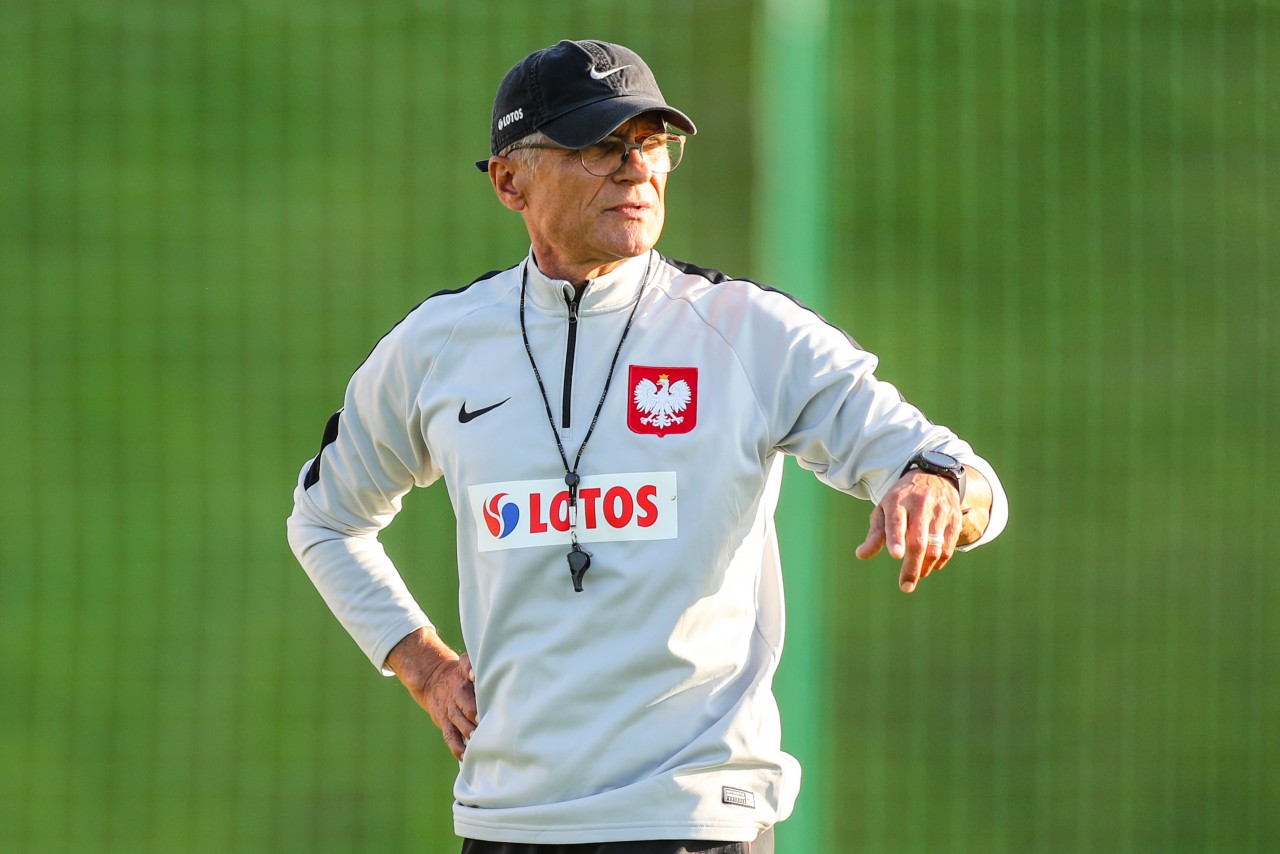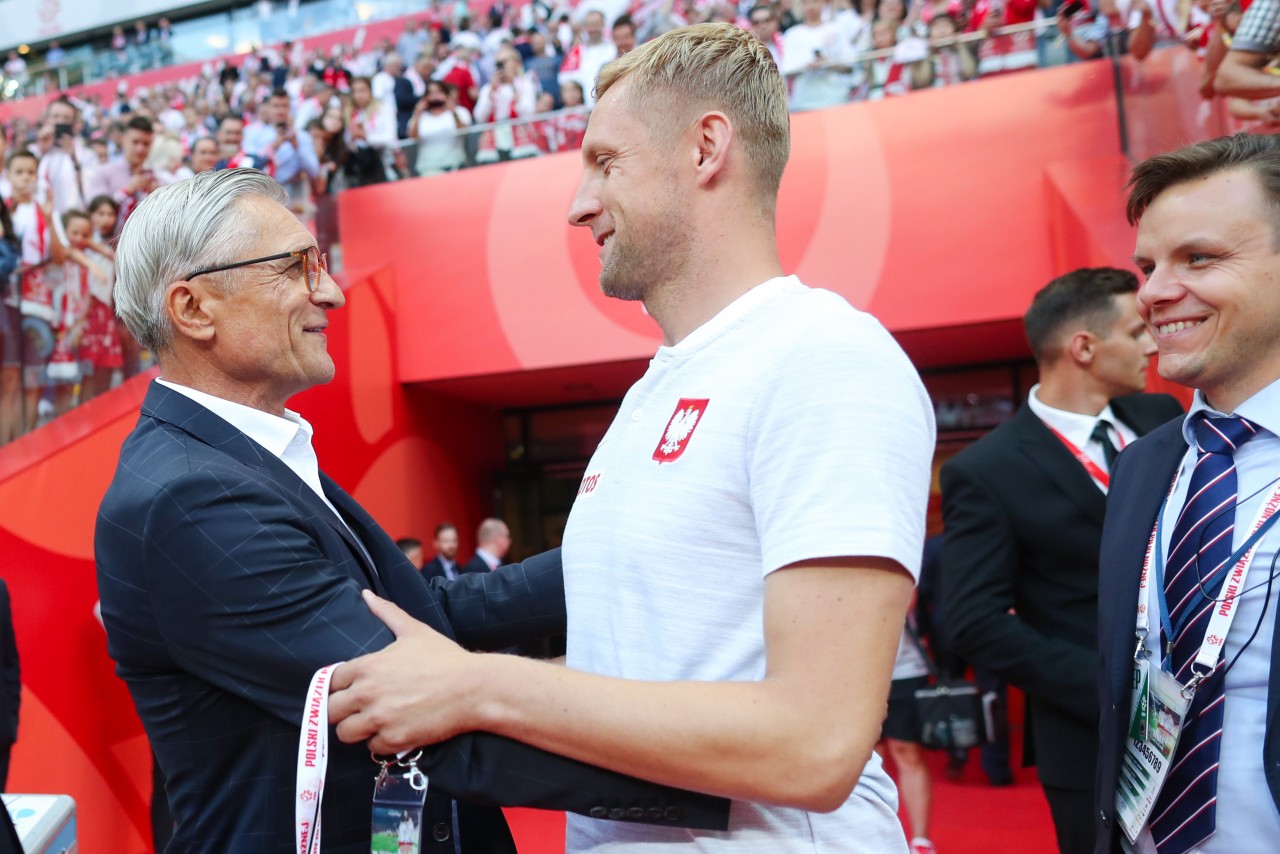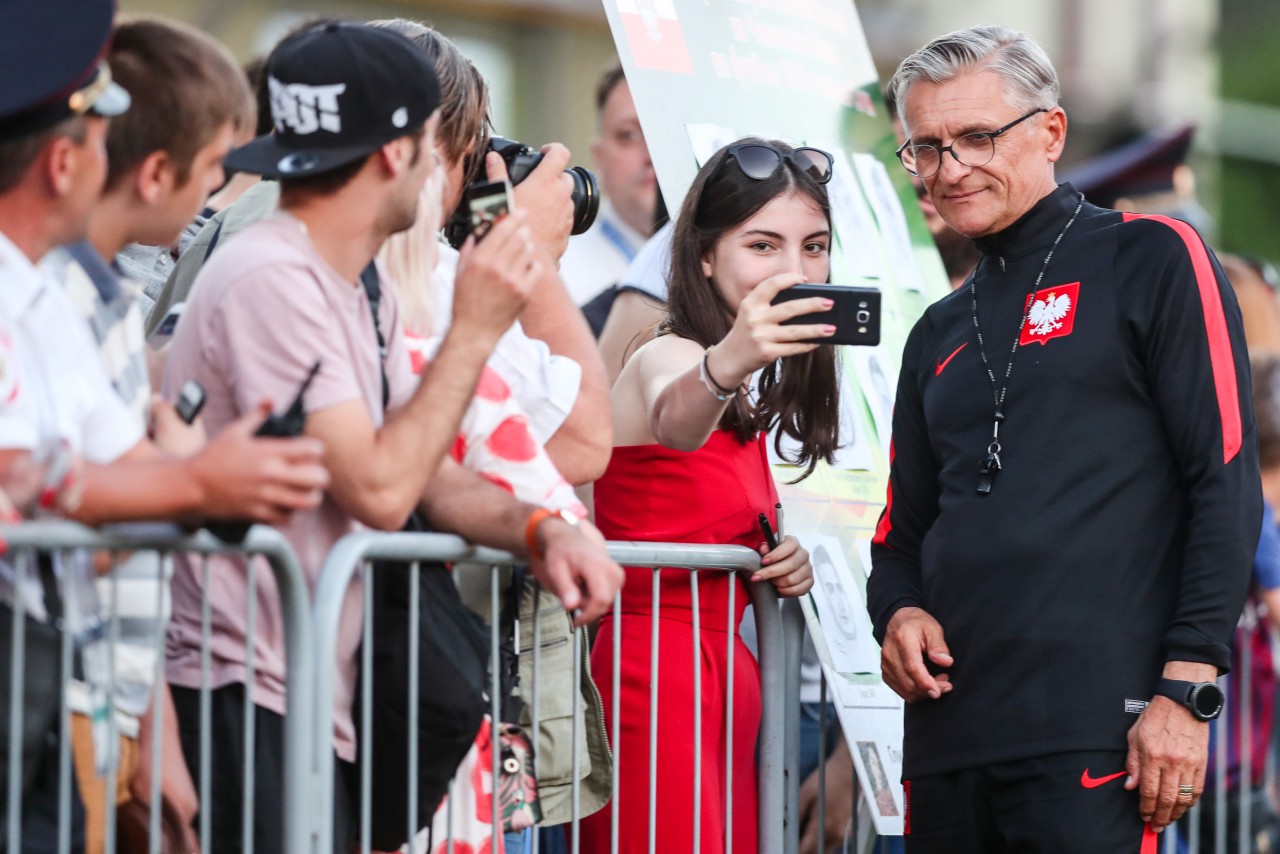NewsNational Team A
Adam Nawałka: Life shaped me as a coach

Adam Nawałka is the first head coach in the history of the Poland national team who managed to lead his team to qualification to the final tournament of both the European Championship and the World Cup. In 1978, he was a player during the World Cup in Argentina, while in Russia he will be leading the white-reds as a coach. Which experiences will help him the most? What will be the key to success during the tournament? What is the role of psychology in his work and what keeps inspiring him as a head coach? Just for us - Adam Nawałka!
When you hear the words "World Cup", what is the first thing that comes to your mind?
The biggest and most important football event in the world. A great tournament where only the best participate. Positive emotions and countless fans who provide phenomenal support. And, naturally, the upcoming World Cup in Russia, which at this point is in our minds 24 hours a day.
As a player, you made your début in the Poland national team on 13 April 1977, at less than 20 years old. A little over twelve months later you were already in the base squad of the national team and so had the opportunity to go to the World Cup in Argentina.
I remember my début very well. We lost against Hungary 1:2 at the Népstadion in Budapest. I played during the second half and just a moment after entering the field I made the scorers' list. Before that, during a training camp, we played an unofficial match against Romania in Płock. We won, and I scored there as well. My début days were therefore bitter-sweet - we won one game, but lost the other. Well, I did score during both matches, so I guess it was ultimately positive. This wast the beginning of my fast track to the heights of football. Just a year later, I went to the World Cup. Apart from one match, against Mexico, when I was out due to injury, I took part in all matches in Argentina.
Five, to be exact. From the first minute to the last. And with quite the result!
I heard many positive opinions, and I myself also felt great with respect to my football skills. I had strength, power, which also helped me to win my place in the first squad of a very strong national team. After all, at that time, the team included such players as Kazimierz Deyna, Henryk Kasperczak or Zygmunt Maszczyk. I competed against them, and successfully at that. This was a great period for me. As one of the young generation players, I made a mark during the 1978 World Cup.
Is there a match of that World Cup from which you have particularly vivid memories?
The first one, as it was very important. To open the tournament, we played against Germany - the then-world champions - in Buenos Aires. We faced them and drew 0:0. Tactically, this was a very high-level game. It may have been a little less exciting for the fans, but for us it was an excellent advance towards the subsequent matches against Tunisia and Mexico, which we won, ultimately finishing at the top of our group.

The second round ended with only one victory against Peru, and losses against Argentina and Brazil meant that we had to say good-bye to the World Cup. This was the only grand tournament in your career, as for health reasons you had to quit playing for the national team when you were only 23. Was this because you were exploited so heavily at a young age?
Indeed, the quality of body control, complete diagnostics, effort monitoring were not up to today's standards. Much like medicine as a whole. Many factors influenced my rapid end of career at the national team level. I tried returning afterwards, but the only result was more injuries and medical procedures. It was a difficult period, but I can confidently say that it helped me become an even more well-rounded person when it comes to character, stability, perseverance, determination in striving towards goals which I have set for myself.
Are your experiences the reason why now, in your coaching work, you pay so much attention to player monitoring and training individualisation?
Yes. I personally felt what lack of care means, so I try to create the best possible conditions for the players. And this applies not only to the national team, but everywhere where I work. Be it a first league club, an ekstraklasa club or the national team, I always make sure that the players have adequate care and are comprehensively prepared in every aspect of development. For me, the player is always the most important.
A historic victory against Germany at the PGE National Stadium in Warsaw, beautifully won qualification to the final tournament of the Euro 2016, followed by excellent play during the tournament in France, where we reached the quarter-finals and only lost - after a penalty shoot-out - to Portugal, the future champions of Europe. Now, you led the team to the World Cup. Is fate giving back to Nawałka the coach what it took from Nawałka the player?
I don't look at it that way. For me, my period as a player was a great experience, which I can use in my current work. It certainly influences my attitude towards managing the team and the players. The sum of my experiences, both from the time when I was a player and from the times when I was managing teams, makes me feel that I am a coach who can offer a lot of help to a player in training-related matters.
"Adam's road to coaching was supported by football achievements and gained experience; this always pays off, as nothing is a better teacher than a good and reasonably spent career as a player. It is half the battle before undertaking coaching tasks," emphasized coach Antoni Piechniczek, who led the national team to third place at the 1982 World Cup in Spain, during an interview with us.
The ability to use the experience from the time as a player, and I don't just mean the training regimen, but also the ability to deal with the atmosphere in the locker room and cooperate with your teammates, is very valuable. The very start of the coaching career is at a completely different level then. This is very useful in team management, especially when it comes to resolving difficult situations. A team is a living organism and you have to react to current events, which may happen in rapid succession, one by one. I experienced this both as a player and as a coach. Leading a team has to be done skilfully, by creating a good atmosphere, climate for work; this is of utmost importance.

You are a titan of work.
I was brought up in the atmosphere of work ethic. It is important for the coach to be able to pass knowledge onto the player and reach the player in such a way as to make him one hundred percent convinced that he should do everything in his power to make use of his talent as much as possible, so that the short career may be a period of fulfilment of dreams and expectations. My role is to help. The fact that right now everything is going well in the national team is also attributable to the fantastic atmosphere. Everyone feels great in the group, the players form a collective, there is remarkable team spirit. This gives strength and power during difficult moments. And this is exactly what a football match at the highest level is about - the ability to overcome these complicated situations and utilize the team's potential. You have to be able to react appropriately. We always work on our mentality; so far we have proven that it is adequate, but we want it to keep getting better and better.
How important is psychology in your work?
Psychology is incredibly important in every aspect of life and there are always reserves to tap. Especially with respect to the ability to lead a team. We can only be successful if everyone understands each other perfectly, and the rules of functioning within the group are clear and plain. It's not about using discipline for show, because that often just causes difficulties. Everything must have its time and place for the team to function correctly.
Members of the national team keep saying that no-one can motivate them better than you. Kamil Grosicki came to the March training camp mentally weak, but after talking with you, he scored a goal against South Korea and made an assist. For the second half, you decided to entrust "Grosik" with the captain's band.
For me, players are the most important. It makes me very happy to see them fit so well in the national team. We are constantly building this group, as the selection process never really stops in the national team. Correct characterological selection of players is critical here. Sometimes players who may seem better at first are not as valuable as those who can function well within a team. Naturally, skills are the most important, but being able to fit into a group is also essential. This is true especially now, before a great tournament, when team members spend a lot of time together. We had our training camps in Jurata and Arłamów, now it's time for the World Cup. Keep in mind that not every player will have the opportunity to go out on the field, and yet the coach has to make them all feel important and needed in the team. This includes players numbered 21, 22 and 23 in the squad. Everyone has to shoot at the same goal. This is why appropriate selection is so important.

Jakub Błaszczykowski, Grzegorz Krychowiak and Arkadiusz Milik, three key players of Euro 2016, have had their problems this season. How can you prepare them to the World Cup so they can return to their leading positions within the national team?
We have our ways of preparing the players as well as possible and making sure that their form is optimal for the World Cup. We have maintained constant contact with each player. The fact that they faced certain difficulties and could not play during all matches in their clubs, be it due to injury or random events, is in the past. Tough, it happened; our role was to draw conclusions, prepare an appropriate plan of compensatory training activities and bring them back into the rhythm of the match to make them strong links in the team during the World Cup.
During the five years of your work as a head coach, what was the biggest change in the Poland national team?
First of all, the progress of our play. Our results show it best. We qualified to the European Championship and reached the quarter-finals of the tournament. We also qualified at the top of our group during the qualifying tournament to the World Cup in Russia, and now we'll be playing during the final tournament. Apart from that, many new players who show great potential entered into the team. We hope that they will be able to fulfil their own, and our, expectations. I believe that my team still has room for development. We are going to the World Cup with high hopes, to show our best and prove that we took the next step on the road towards improving our play, and therefore - towards giving our fans even more reasons for joy.
After the European Championship in France, fans are hungry for success. You, however, keep cool, though you emanate strong self-confidence.
Self-confidence and faith in one's own abilities is very important. But at the same time, so are humility and the ability to distance oneself from what awaits. You always have to respect your opponent, and this respect is best shown by preparing to the match as well as you can and playing to the absolute best of your ability. A team hungry for success should demonstrate willingness to constantly improve its level. And, of course, should be ready for sacrifices, demanding training regimens, but also for a reset when appropriate, so that it can enjoy what it has achieved. A smile makes this work even more satisfying.
For some veteran national team players, such as Łukasz Fabiański, Jakub Błaszczykowski, Łukasz Piszczek or Sławomir Peszko, this may be the last grand tournament in their careers. Is this grounds for even greater motivation before the World Cup?
The World Cup tournament itself is reason enough to feel motivated and determined to play to the best of one's abilities. I can assure you that no-one is currently thinking about ending their career; the players are interested solely in the World Cup. They are happy that they can participate in the tournament, that they can provide excitement for the fans and that they have regained the fans' trust.

What will be the key to success during the World Cup and what is the minimum to make you satisfied?
I don't want to talk about minimum goals. We are only interested in the first match. Of course, we are prepared for subsequent games as well, but everything will depend on the first one. The start is critical. During the tournament, being well-prepared in all aspects is what counts. Motor skills, tactics, an idea for every match - and the ability to keep a cool head and react in difficult moments. This is what decides a team's strength when competing against the best.
Details - you always pay attention to them. At the training camp in Arłamów, you even made sure that the VAR technology, which for the first time will be implemented during the World Cup, was used during the control game.
Details are crucial in football. They decide the score and success when the level is even. We try not to neglect anything and leave as little as possible to chance. Since VAR will, for the first time in history, be used during the World Cup, we wanted to prepare the team for that as best we could. This will be a completely different level of refereeing, so the players had to know what to expect, what they can assume, and what they should watch out for in order to avoid mistakes. We wanted to be a step ahead, not a step behind. This is why we prepared VAR-related presentations and had a training session with Szymon Marciniak, one of the best international referees in the world. The video replay system was also in use during the control game in Arłamów. Such details are very important; you have to make use of whatever you can. However, let's not forget that preparing the players in terms of motor skills, tactics and mentality remains the most important issue.
When did you have more unanswered questions regarding preparations for the tournament and player selection: now, or before Euro 2016?
Definitely now. Before the championship in France, we had a smaller number of players at the training camp compared to the World Cup. This time, we took 32 players to Arłamów. We had injuries in the team, not all players were in top shape, and several players considerably stood out in their respective leagues. We wanted to test them; rivalry has always been, is and always will be present within the team. It is a lever for progress and so long as there is a positive attitude towards competition, it will only help. We widened our selection with respect to usefulness at a given position and it looks promising. Certain things have to be taken into consideration in advance. I do not preclude that we may be playing with four defenders during the World Cup in Russia. We keep practising this formation, as well as that with three defenders. We will make decisions regarding selection and play strategy in due time.
Is the fact that our group opponents are from three different continents and present completely different play styles going to make things more difficult for us?
From a technical perspective, with respect to analysis of the opponents’ play, this poses no problem at all. We have a substantial collection of videos, we also watch our rivals live; we will be well-prepared. Even though most players from the Senegal, Colombia or Japan national teams usually play in Europe, each team has something unique in the way it plays football. These are the best teams of their respective continents and I can only be happy that we happened to be playing against them. A fantastic experience awaits us, with matches shaping up to be very exciting; therefore, we want to be well-prepared for each one.
When we found out our World Cup rivals, we changed our sparing plans and contracted matches against Nigeria, South Korea and Chile. These opponents were to play in a style resembling - respectively - Senegal, Japan and Colombia.
After the qualifying tournament, when we took the first place in the group, we have already had certain training variants selected; nothing could surprise us. Immediately after the draw, we prepared a detailed plan of both analysis of the opponents’ play and our preparations for each match. We carried it out consistently and are looking towards the future with optimism.

What is the biggest difference between the work of a club coach and a national team coach?
A club offers an opportunity to perfect the play on a daily basis. You can really do a lot, it is an incredibly effective work, with visible progress. On the other hand, a national team requires a completely different strategy of action. I have the best players in the country at my disposal and have to utilize the short time for training camps to the fullest in order to improve their play and harness their potential. The plan, strategy of action and logistics at the highest level are crucial here.
What keeps inspiring you as a head coach?
For me, the team and the players are the most important. We always strive to optimally prepare for a given challenge and draw out the full potential of the team. Of course, the joy of success also counts. I hope that the upcoming World Cup will give us plenty of optimism for future work.
Do you have any role models? And what is the source of your energy?
I do not have any role models. Life shaped me as a player and as a coach. I always had an optimistic mindset, I sought this positive energy. I also try to keep active. Nothing changed in my attitude towards coaching tasks; I still enjoy them.
What are your dreams as a coach?
That is another match.
Interviewed by Paweł Drażba
